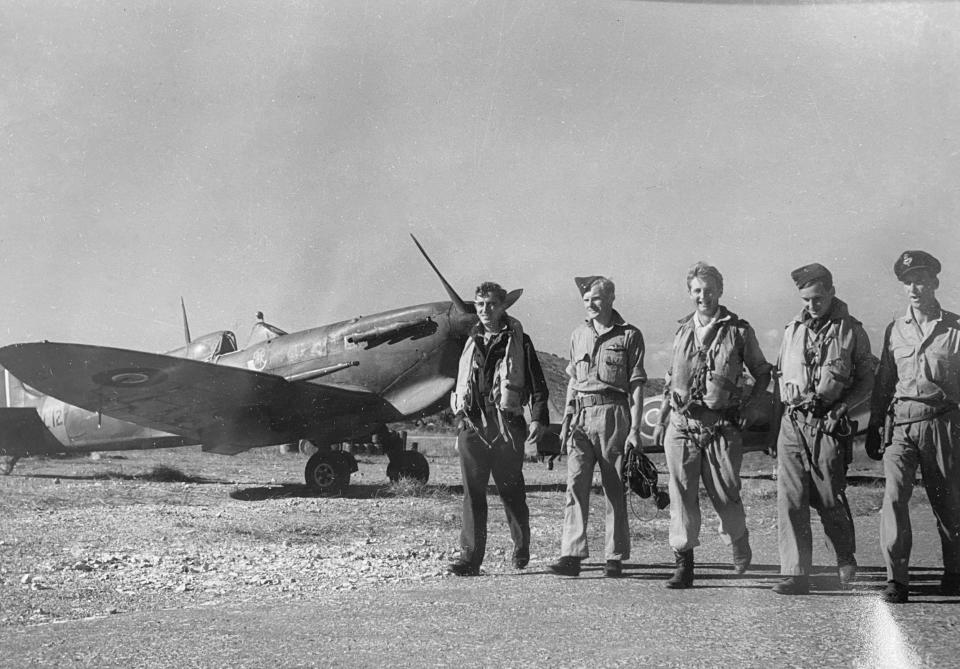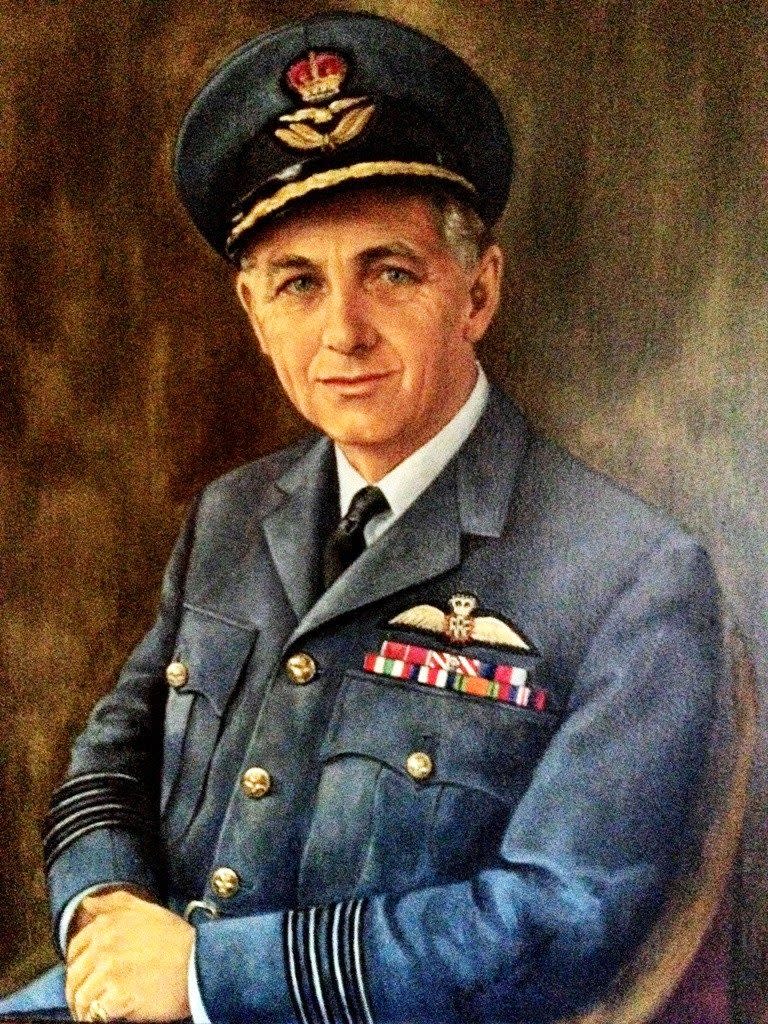Group Captain Derek Rake, Spitfire pilot shot down over Yugoslavia and rescued by partisans – obituary

Group Captain Derek Rake, who has died aged 98, flew Spitfires over the Balkans and north-western Europe, and was involved in combat with Luftwaffe jet aircraft in the closing weeks of the war.
In March 1945, Rake joined 41 Squadron, which was part of the Second Tactical Air Force and flew from captured Luftwaffe airfields in the Netherlands and Germany. The squadron was equipped with the superb Mark XIV version of the Spitfire, which was powered by a Rolls-Royce Griffon engine, making it one of the RAF’s most formidable and capable fighters.
The squadron flew armed reconnaissance missions over Germany, attacking rail and road movements and patrolling over German airfields. The Luftwaffe had deployed jet fighter and bomber aircraft, and 41 Squadron’s Spitfires were soon in combat with them. On April 20, Rake took off from Twenthe in the eastern Netherlands as No 2 to the Australian “ace” Tony Gaze.
Clearing cloud at 20,000 ft near Bremen, they saw an Arado 234 twin-engined jet bomber. Gaze attacked and damaged the enemy aircraft, which dived away. Rake followed it, and later described the action: “My opening burst hit the port engine, which began to smoke as it rolled over and dived towards the cloud. I got in one or two more bursts as I followed it down.”
The pilot attempted to land his stricken aircraft, but it exploded on impact. Gaze and Rake were credited as having shared in the destruction of the jet bomber.
The squadron was in constant action for another two weeks. On May 3, Rake attacked and destroyed a Junkers JU 188 bomber in the Lübeck area on the Baltic coast. It was 41 Squadron’s 200th and final enemy aircraft shot down.

Derek Shannon Vaughan Rake was born at Alderholt, Dorset, on May 26 1922 and attended Wimborne Grammar School, where he was head boy and played for the first teams at cricket and rugby. Determined not to follow in the family tradition of practising medicine, he entered Southampton University to study History. He joined the University Air Squadron, and after the bombing of Southampton immediately joined the RAF.
He trained as a pilot in the United States under a bilateral scheme, graduating first in his class. To his frustration, he was retained to be a flying instructor, but finally, after much pestering, he returned to England in April 1943 and trained on the Spitfire.
Rake joined 32 Squadron in August 1944, when it was based in southern Italy. He flew ground-attack operations as the Allied armies advanced in Italy, and also in support of the partisans in Yugoslavia.
For these close-support operations over Yugoslavia, small detachments of aircraft deployed to the island of Vis off the Axis-held Dalmatian coast; Rake took a flight of Spitfires to the island.
Very heavy rain flooded the short landing strip, leaving the Spitfires stranded. Rake issued IOUs on behalf of the British government to the local population, who worked for five days and nights to clear a 350-yard strip, the absolute minimum for a Spitfire take-off.
Rake and his pilots had barely cleared the trees at the end of the strip when they had to take off, and he always regretted that he was never able to return to the island to ensure that the Government had honoured those IOUs.
At the beginning of November 1944, the squadron moved to an airfield in Greece. On the 18th, Rake was flying a mission in the Vardar Valley near Srebrenica when his Spitfire was hit by anti-aircraft fire as he attacked a train.
He managed to crash-land in a field, where his aircraft overturned; despite injuries to his arms and hand, and being soaked in aviation fuel, he managed to extricate himself.
A local farmer and his wife sheltered him overnight in a chicken coop. German forces searched the farm overnight, but ignored the coop. Rake was given a horse, and the following day rode to Skopoli, where a family took him in to their home and called a doctor, and he was handed over to the Resistance.
He was taken over the mountains into Greece and, 12 days after being shot down, he returned to his squadron at Salonika, much to the surprise of his colleagues. After recovering, he went back to Britain to recuperate before joining 41 Squadron.

In August 1945 Rake was posted to India as an instructor on fighter tactics; there he met his future wife, Rosamund, an Army nurse he always called Sue. In March the following year he moved to Mingaladon in Burma to be the flight commander on 20 Squadron, flying Spitfires and Tempests.
At the end of 1949 he left for the Far East, where he formed the Hong Kong Auxiliary Air Force, which was equipped with training aircraft and Spitfires to protect the local air space. He also established a fighter control unit equipped with radars to control patrolling Spitfires. After two years he was awarded the AFC.
After attending RAF Staff College in 1952, Rake served at the HQ Coastal Command responsible for major works services on the Command’s airfields, which resulted in his being appointed OBE.
He spent two years as deputy chief of the Air and Special Operations Division at the Supreme Headquarters Allied Powers Europe at Rocquencourt in France, before returning to flying duties in July 1958. He was appointed to command 192 Squadron at Watton in Norfolk, and equipped with specially modified Comet and Canberra aircraft.
Re-designated 51 Squadron, the unit was tasked with collecting electronic and radio intelligence. The aircraft flew patrols in international waters off the coasts of the Soviet Union and Warsaw Pact countries. This frequently involved flights from bases in northern Norway and from Cyprus.
During his two-year period in command, Rake flew more than 50 operational intelligence-gathering sorties. His Commander-in-Chief told him that the Air Ministry had considered recommending him for the DSO – but decided against on the grounds that “it would draw unwelcome attention to the activities of the squadron.” In the event, he won a Bar to his AFC.
Rake served in the Air Ministry, co-ordinating these secret flights, before serving as the senior air staff officer at the Central Signals Establishment.
He maintained his close involvement in intelligence collection when he was appointed to command RAF Wyton near Huntingdon in January 1967.
This was the home of his old squadron, No 51, comprising Victor strategic reconnaissance aircraft, and a Canberra photographic reconnaissance squadron. Throughout his two and a half years in command, Rake continued to fly all the station’s aircraft. He always regarded this tour as the peak of his career.
After a series of staff appointments, Rake retired in March 1976. He gained a diploma in accounting and finance and became general manager of the newly opened Wembley Conference Centre. When he finally retired, he pursued his lifelong love of golf: he played two or three times each week at the East Berkshire Club until he was 96, when he suffered a fall that ended his playing days.
His wife and only daughter predeceased him. He is survived by his son Sir Michael Rake, chairman of Great Ormond Street Hospital and a former president of the CBI.
Derek Rake, born May 26 1922, died December 11 2020

